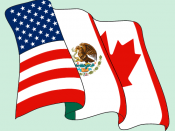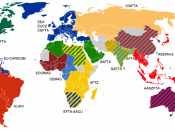A cargo ship is slowly pushed to the docks by the tugboats. The ships crew prepares to unload its cargo. The special thing about this cargo is that its freight has no extra charge from the importing country. It was shipped without a tariff or quota on it. It was simply traded to the importer like a basic everyday business transaction. It's like when you have a garage sale, you don't need to pay extra money to sell something and there is no extra cost added to it from the purchase. That is what the ships crew is getting ready to unload, but is this the future of international trade?
Free trade is defined as trade between two separate entities, usually countries, with little to no governmental interference and regulations. Also called opening trade, would allow all nations to prosper and develop fairly and equitably (Free Trade 1). The idea of free trade is still just a dream.
It is however a dream that most of the world would probably love to be living. To be able to move, sell and buy goods anywhere in the world without any governmental interaction is the ultimate for any worldwide organization. The dream is beginning to be realized in many places with local trade agreements, such as NAFTA, but worldwide free trade is a long way off.
How could something that would be beneficial to so many, not be implemented and implemented soon? The reason is that everybody has many ideas of what free trade should be. This lack of sound ideas has led to many criticisms and issues to be brought against the idea of free trade. The following paper will present these criticisms and evaluate the effect of these issues on the continuous attempt to utilize a global free trade policy.


